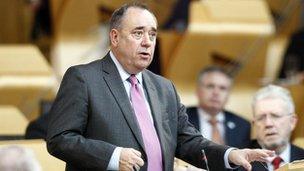Alex Salmond outlines SNP government plans for year ahead
- Published
- comments
Automatic early release from prison for the most serious violent and sexual offenders is to be scrapped, the first minister has announced.
Alex Salmond made the commitment as he set out the Scottish government's law-making plans for the year ahead.
There are 13 new bills in the legislative programme for 2013-14.
They include measures to overhaul the civil courts, introduce a licensing system for air weapons and end the right to buy for council tenants.
Mr Salmond told MSPs at Holyrood on the first day back from their summer break: "We have all now accepted the need to end the system of automatic early release which was brought in by the Conservative government in 1993 and then left in place by the Labour and Liberal Democrat coalition here at Holyrood.
"It does not command public confidence.
"We are now in a position to end automatic early release for sexual offenders getting sentences of four years or more and for serious violent offenders."
The types of violent offending covered will include culpable homicide, attempted murder, serious assault and robbery. The offender must receive a sentence of 10 years or more.
The types of sexual offending covered will include rape, sexual assault and sexual offences against children, where an offender has received a sentence of four years or more.
As at 3 September 2013, there were 258 prisoners in Scottish jails serving 10 years or more, out of a total population of 8,282.
The plan will be taken forward in an amendment to the Criminal Justice Bill, announced on top of the 13 new pieces of legislation in the SNP government's programme.
Mr Salmond was outlining his plans little more than 12 months before the independence referendum.
A bill to hold the referendum, on 18 September next year, is currently going through parliament and is expected to be passed shortly.
Mr Salmond argued that the Scottish Parliament's record on decision-making would help to make the case for independence.
Beginning his address to MSPs, he said: "It is better for all of us if decisions about Scotland's future are taken by those who live in Scotland."
'Crucial test'
The legislative programme, outlined by Mr Salmond, will also set up Revenue Scotland, a new body to administer devolved taxes.
The Licensing Bill will extend regulation for scrap metal dealers in an attempt to reduce metal thefts and introduce an offence of supplying alcohol to under 18s.
The government also aims to change the way heritage body Historic Scotland operates, create a new food standards body and make mental health legislation more efficient.
Other legislation will change the laws relating to damages and personal injuries, legal contracts and bankruptcy.
Mr Salmond said one of the most important bills would strengthen community planning while simplifying right-to-buy provisions.
As with every year, the government will also set out its spending plans in a Budget Bill.
Labour leader Johann Lamont claimed the programme showed Mr Salmond's priorities were wrong.
She said: "It was an opportunity to show us that we could take him seriously as Scotland's first minister.
"He could do that by bringing forward a legislative programme that met this one crucial test: that it would put the interests of the people of Scotland before the interests of the SNP.
"With this unambitious, lacklustre and moribund programme he has completely failed."
'Viable alternative'
Conservative leader Ruth Davidson accused the first minister of "limiting" Scotland's ambitions.
She said: "This programme is notable not for what it achieves but for what it does not.
"It does little to extend the advantages he has because it's not in his interest to make devolution work we believe it can.
"It is in his narrow self-interest to hold back this country, to limit its ambitions within the framework of the United Kingdom, and to present a deliberately negative and uninspiring picture of Scotland."

Mr Salmond said the Scottish Parliament's record would help to make the case for independence
Liberal Democrat leader Willie Rennie said his party's plan for home rule within the UK is a viable alternative to independence.
"Everyone in this chamber wants the best for Scotland. I am in no doubt about that. We just disagree on how we want to achieve it," he said.
"My support for a strong Scottish Parliament with home rule in a strong partnership with the UK is on the record.
"The stakes are high, the risks are great, but the opportunity to offer a renewed constitutional settlement within the UK is within our grasp."
'Mostly inoffensive'
CBI Scotland said the government's legislative programme contained "a number of useful measures" but assistant director, David Lonsdale, said it "a missed opportunity to signal a fresh direction on public service reform, through ensuring that the private and third sectors have a 'right to bid' to deliver a far wider range of public services".
The Federation of Small Businesses said the programme was "mostly inoffensive" with "a few nuggets" which could give a long term boost to the small business community.
The first minister's plan to bring forward a Food Standards Scotland Bill was criticised by the Scottish Retail Consortium who said it would be "bad for customers and businesses".
Director Fiona Moriarty added: "This bill will diminish the resources dedicated to food safety and scientific advice by diluting a pooled UK-wide resource and replicating work across two separate bodies."
The Law Society of Scotland welcomed a number of the bills contained in the legislative programme, including the Conclusion of Contracts Bill and the Revenue Scotland and Tax Powers Bill, which it said marked a "significant moment in post-devolution Scotland".
However, Kim Leslie, convener of the society's civil justice committee said sheriff courts would need to ensure they were "adequately resourced" to manage the significant transfer of business as a result of the Courts Reform Bill.
She added: "Otherwise, court users could face substantial delays."
- Published3 September 2013
- Published3 September 2013